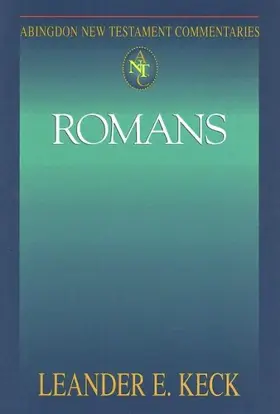

Romans
in Abingdon New Testament Commentaries
Pages
400 pages
Publisher
Abingdon Press
Published
11/30/2005
ISBN-13
9780687057054
"Like widely differing siblings raised by the same parents, each letter produced by Paul has its own distinguishing character. For the historically minded critic, each letter’s unique traits provide important clues for detecting the circumstances in which Paul wrote it as well as what he hoped to achieve with it. Scholars assume that by examining the content of the letter (the “answer”), they can infer the readers’ situation that Paul is addressing (the “question”)--a method sometimes called “mirror reading.” In the case of Romans, however, both the particular traits and the overall content are so unusual that scholars continue to debate why Paul wrote precisely this letter and what he hoped to achieve by it in Rome."
So begins Leander Keck's seminal work on the New Testament book of Romans. Keck asserts that because Romans is part of the New Testament, we can compare it with the other letters ascribed to Paul, as well as with what Acts reports about his message and mission. But the first readers of Romans had only this letter; they could compare it only with what they may have heard about him. While this commentary does from time to time compare Romans with what Paul had said before, it concentrates on Romans itself; what Paul says in this text should not be conflated with--nor inflated into--what he thought comprehensively, though it is essential to understand that as well.
Collections
This book appears in the following featured collections.
- New Testament Commentaries & Monographs by Princeton Theological Seminary
Reviews
For such a modestly sized commentary, this is a surprisingly thorough and theologically profound commentary. It pays close attention to the Greek text, differences between common English translations and deftly summarises the exegetical debates.
A commentary on such a central New Testament epistle from a Pauline scholar of Leander Keck’s stature is certainly a welcome development. Keck does not disappoint. For readers not familiar with the Abingdon New Testament Commentaries, the series aims to make the results of critical biblical scholarship available to a wide audience of educated readers, including pastors, university students, and leaders in local churches. The primary translation used is the NRSV, though Keck often cites other translations as well as providing his own. Organized around units of text rather than individual verses, each section (e.g., 2:1–16 or 15:7–13) consists of three parts: an introductory piece covering matters of genre, structure, and individual themes; an exegetical section treating leading ideas and development of thought; and a final section analyzing the theological and ethical significance of the passage. The book includes a bibliography of cited works and an index of theological topics. An index of modern authors would have enhanced the book’s usefulness. Keck’s twenty-page introduction deals with traditional matters of style and structure, theology, and setting and purpose. He helpfully describes Romans as a “discourse within a letter” (23).
[Full Review]
With this book Leander Keck has given us a masterful brief commentary on Romans, constantly challenging and thought-provoking, forcing its reader to reexamine and rethink the words of the apostle Paul. After a succinct introduction, situating Romans in its literary, historical, and theological context, Keck offers his interpretation of the letter. The commentary is not verse by verse but passage by passage, making it easier to follow conceptually but of course difficult to find what Keck has to say about a particular verse. There is no translation of Romans provided. Instead, Keck frequently comments on a very wide range of contemporary translations and sometimes offers his own. On Keck’s reading, the Epistle to the Romans provides a Jewish answer to a Greek problem. The problem is the human condition. Human beings are not autonomous but controlled by their own passions and desires, and they cannot escape the tyranny of death. Paul rejects the Greek view that right knowledge leads to right deed. Instead, the solution is Christ, interpreted within the categories of Jewish apocalyptic. Jewish apocalyptic is perfectly fitted for this purpose, because of its emphasis on the universality of God’s rule and his judgment.
[Full Review]
Years ago when I was still writing my own commentary on Romans and enquiring what other work was being planned in the field, I remember being excited by grapevine reports that Lee Keck had agreed to write the Romans volume for one of the major commentary series. I remember also the disappointment when, in due course and a good few years later, the Romans commentary appeared in that series from a different author. The disappointment was slight, since the other contributor was weighty in his own right. But disappointment there still was since I knew that a Romans commentary by Keck would demonstrate a theological acumen, a penetrating insight, an ability to keep in view the wood without getting lost in the trees, and a neatness and terseness of expression that few others in the field today can rival. The disappointment was much diminished when I learned that Keck had been recruited to the Abingdon series and completely assuaged when I read the volume itself. In some ways, indeed, the Abingdon format plays to Keck’s strengths. We do not really need another major commentary that loses us in the minutiae of word studies, literary parallels, sociological and rhetorical hypotheses; we have such in plenty.
[Full Review]


